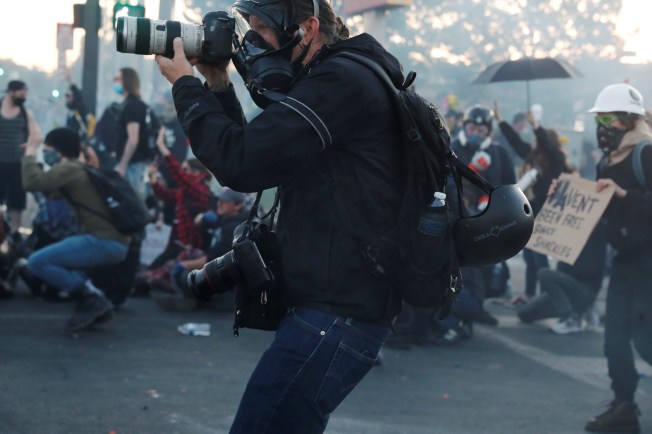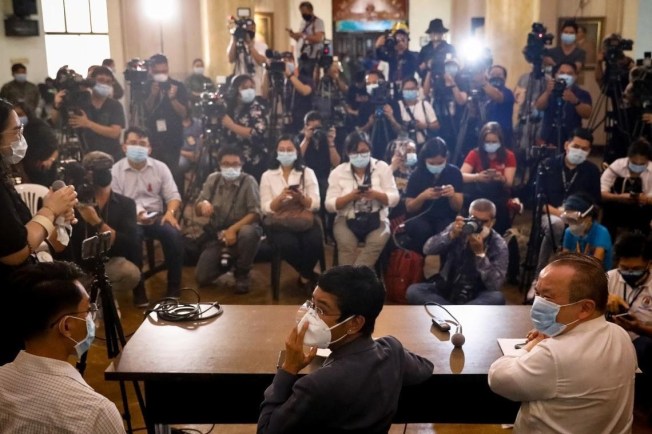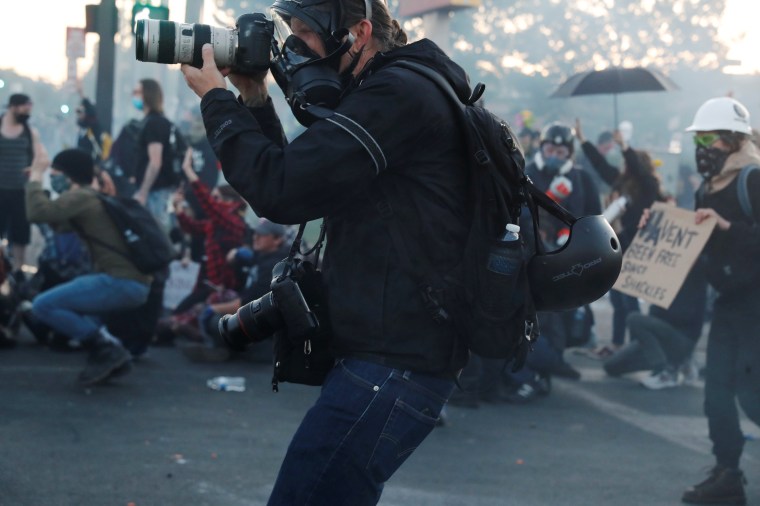CPJ Insider: Summer 2020 Edition
Over recent weeks, as journalists across the United States were attacked and assaulted while reporting on the George Floyd protests, you stood with us and supported press freedom. Thank you.

CPJ board, partners demand end to attacks on journalists at U.S. protests
During the protests that spread quickly across the nation, CPJ worked closely with the U.S. Press Freedom Tracker, which we co-launched in 2017, to document and investigate hundreds of cases in which the press was attacked with rubber bullets, tear gas, or pepper spray, or arrested despite identifying themselves as journalists. As of late June, the Tracker was investigating more than 450 violations in 71 cities across 35 states. To help journalists confront the dangers of reporting on the protests, our Emergencies team issued a safety advisory, which contained advice similar to what we provided to journalists covering recent unrest in Venezuela and Hong Kong.
Meanwhile, CPJ led an open letter to President Trump, signed by 72 global press freedom organizations, as well as a letter to U.S. governors, alongside photo agencies, demanding they hold perpetrators of press freedom violations to account. In a move rarely seen in our organization’s history, CPJ’s board issued a powerful open letter to state and local leaders and police chiefs across the country demanding a halt to attacks on the press.
We’ve also been working to ensure that the U.S. Congress responds to attacks on journalists covering protests across the U.S. CPJ contributed to and welcomed resolutions reaffirming the importance of a free press in the U.S. House and Senate. We continue engaging leaders at the national and local level to address abuses of power against the press.
We’ve done more than 70 interviews and written multiple op-eds—noting, in particular, our concern that police brutality against journalists appears to be deliberate and targeted in many cases, and that Black journalists are particularly vulnerable.

As the COVID-19 pandemic continues, so does CPJ’s support for journalists
More than 11,000 of you—from over 160 countries—signed our petition to #FreeThePress earlier this year. Since the launch of the campaign, at least 13 journalists have been released from prison. But we know we have more work to do, as the pandemic remains a risk to reporters everywhere. We continue to issue multiple safety advisories, offer security consultations to journalists and newsrooms, and provide financial and non-financial assistance to press under threat. In the first six months of 2020, CPJ’s Emergencies team assisted more than 170 journalists, helping to address concerns that ranged from a lack of personal protective equipment to ways to cover the crisis safely.
We also shared the petition with UN Secretary General, António Guterres, and called for his support. We were pleased when he responded:
“I wish to reiterate my personal commitment, and that of the United Nations as a whole, to continue to defend media freedom and the safety of journalists during the COVID-19 pandemic and beyond, including by advocating, publicly and bilaterally, for the release of journalists detained arbitrarily. No democracy can function without press freedom, which is the cornerstone of trust between people and their institutions, and which is most critical at a time of crisis when citizens demand accountability.”
We’re also paying close attention to press freedom violations that are taking place all over the world, as leaders seek to restrict the media. We mapped these violations through the end of May and noted 10 “symptoms” to monitor in the prognosis for a free press.

CPJ fights for Maria Ressa, issues a report on Trump and the press, and follows up with Syrian journalists we helped evacuate
CPJ continues its everyday mission to protect press freedom all over the world. That includes defending a free press in the Philippines, where Rappler co-founder and executive editor Maria Ressa, along with her former colleague, Reynaldo Santos, were sentenced to a maximum of six years in jail earlier in June. The two journalists are represented by human rights lawyer Amal Clooney and are out on bail as they appeal the verdict.
Maria was CPJ’s 2018 Gwen Ifill Press Freedom Award winner. During her rousing speech at CPJ’s awards ceremony that year, she said, “Every battle you win or lose, every compromise you choose to make or to walk away from, all these struggles define the values you live by, and, ultimately, who you are. We at Rappler decided that when we look back at this moment a decade from now, we will have done everything we could: We did not duck. We did not hide. We are Rappler, and we will hold the line.”
—
This spring, CPJ released a report, “The Trump Administration and the Media,” written by Leonard Downie Jr., former executive editor of The Washington Post and author of CPJ’s 2013 report that covered the Obama administration’s aggressive prosecution of leakers and heavy use of surveillance programs, among other issues.
In the report, Len examines the challenges and threats to press freedom in the United States and how President Trump’s anti-press rhetoric has emboldened authoritarian leaders globally to crack down on the press in their own countries. The report includes recommendations to President Trump, calling on him to stand up for press freedom, refrain from discrediting the media, and improve access to information. We also sent a letter to the White House, asking for a meeting, along with the report. We have not yet received a response.
—
In early 2020, we followed up with some of the Syrian journalists whom we helped to evacuate last year. The journalists were trapped in the southern part of Syria, hemmed in by Assad’s forces. (You can read more about our efforts in our 2019 Annual Report.)
Check out the video to hear from the journalists themselves.
CPJ Mentions & Op-Eds
“Journalists in firing line as Trump inflames US protests,” Irish Times
“America’s cops must stop attacking journalists,” Project Syndicate
“Journalists at George Floyd protests are facing attacks,” Katie Couric’s “Wake-Up Call”
“How to stay safe while attending protests,” MSN
“Editorial: Trump’s disdain for the free press is enabling media suppression globally,” St. Louis Post-Dispatch
“Voice of America to become Voice of Trump,” AsiaTimes
“Big Brother and the coronavirus: Will pandemic be used to expand surveillance state?” Salon
“We need journalists to be our window on a wider world, especially during lockdown,” Daily Maverick
“Virus gives Bolivia’s ‘interim’ president chance to extend rule,” DNYUZ
“A journalist’s harrowing escape from India during the COVID-19 crisis: Part 2,” Forbes
“As coronavirus spreads, no journalist should be sidelined in prison,” Inter Press Service
“Maria Ressa and the public interest,” Columbia Journalism Review
“A journalist’s conviction spells trouble for democracy in the Philippines,” The Washington Post
“Journalism is still my world, says Syrian who found refuge in Spain,” Voice of America
“A reporter in Kyrgyzstan has been in prison since 2011 after reporting on ethnic violence. If an upcoming appeal fails, he could be locked up until he dies,” Business Insider Australia
“The Ultimate Form of Censorship,” Good Governance Africa
